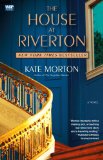Summary | Excerpt | Reading Guide | Reviews | Beyond the Book | Read-Alikes | Genres & Themes | Author Bio

A Novel
by Kate MortonThis article relates to The House at Riverton
As mentioned in the notes at the end of The House at Riverton, author Kate Morton is fascinated with the whole concept of nobility and servant classes. I think many people who aren't familiar with such a strict class system, notably Americans and Australians like Morton, are also intrigued by the thought that there could have been a whole class of people whose unalterable life purpose was to serve others. The first book I read that introduced me to the existence of an unquestioning, invisible class of people was The Lodger written in 1913 by Marie Belloc Lowndes. It is a terrific book but the most memorable thing about it is the fact that even though the couple, the Buntings, suspect their lodger might be Jack the Ripper they don't allow themselves to question him because he is a member of the gentry*.
In her notes Morton mentions several other sources that either inspired or informed her knowledge of the period. In addition, the British current affairs magazineThe New Statesman recently published an interesting article commenting on the changes in the British class system between the past and present.
As for the drastic changes that occurred in England following the death of Queen Victoria in 1901 (which prompted H.G. Wells to say, "Queen Victoria sat on England like a great paper weight and that after her death things blew all over the place.") and, most significantly after WW I, British TV's Channel 4 produced a reality series calledThe Edwardian Country House, broadcast in the United States on many PBS stations, that followed several 21st Century people who volunteered to embed themselves into a facsimile of an early 20th Century British country household. Channel 4'swebsite offers lots of information not just about the show but about the Edwardian era itself (which refers to the reign of extrovert King Edward VII from 1901 to 1910, and is sometimes extended to include the period to the end of World War I in 1918).
*The word gentry derives from the Latin gentis, meaning clan or extended family. In England, the term landed gentry was long used to describe landowners without the heredity titles to be considered members of the peerage (nobility) but a step above the yeoman class, some of whom would also be landowners but unlike the gentlemen farmers, would farm their own land rather than employ others to do so.) The terms live on in what is still the definitive guide to the family trees of the British landed classes - Burke's Peerage and Burke's Landed Gentry. Referring to the habit of newly wealthy families to enhance their pedigrees, Oscar Wilde once referred to Burke's Peerage as "the best thing the English have done in fiction."
Filed under Cultural Curiosities
![]() This "beyond the book article" relates to The House at Riverton. It originally ran in May 2008 and has been updated for the
March 2009 paperback edition.
Go to magazine.
This "beyond the book article" relates to The House at Riverton. It originally ran in May 2008 and has been updated for the
March 2009 paperback edition.
Go to magazine.
Your guide toexceptional books
BookBrowse seeks out and recommends the best in contemporary fiction and nonfiction—books that not only engage and entertain but also deepen our understanding of ourselves and the world around us.